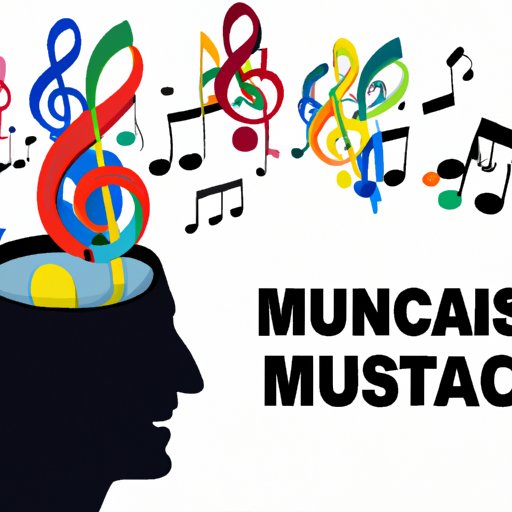Introduction
Mental health is an integral part of our overall wellbeing. It affects our thoughts, emotions, and behavior, and it plays a major role in how we interact with others and cope with life’s challenges. Poor mental health can manifest in a variety of ways, such as feelings of sadness or loneliness, difficulty concentrating, changes in appetite or sleep patterns, and decreased energy levels.
Music is a powerful tool that can be used to support mental health and improve overall wellbeing. While there is no one-size-fits-all approach when it comes to managing mental health, music has proven to be an effective strategy for reducing stress, improving mood, and promoting relaxation. In this article, we will explore how music can help with mental health.
Exploring the Benefits of Music Therapy
Music therapy is a form of psychotherapy that uses music to help individuals cope with emotional difficulties and achieve their therapeutic goals. It is based on the idea that music can have a positive effect on both the mind and body, and that it can be used to treat a wide range of physical, mental, and emotional issues.
The primary goal of music therapy is to promote emotional healing, increase self-awareness, and improve communication skills. It is often used to help people manage stress, reduce anxiety, and overcome depression. In addition, music therapy has been found to be beneficial for those suffering from chronic pain and illness.
Examining the Relationship Between Music and Mood
Music has the power to influence our emotions and affect our mood. Listening to certain types of music can evoke different feelings, such as joy, peace, or excitement. Research has shown that music can be a powerful tool for improving mood and reducing stress.
Studies have found that upbeat music can increase positive emotions and improve overall mood. Slow, relaxing music can be used to reduce stress and induce a state of calmness. Music therapy can also be used to help regulate emotions and boost self-esteem.

Investigating the Power of Music to Reduce Stress
Stress is a normal part of life, but if left unchecked it can lead to serious mental health problems. Prolonged stress can lead to feelings of depression and anxiety, as well as physical symptoms such as headaches and fatigue.
Music has been shown to be an effective tool for reducing stress. Studies have found that listening to calming music can lower blood pressure and heart rate, while uplifting music can improve mood and reduce stress hormones. Music therapy can also be used to help cope with difficult situations, such as the death of a loved one or a traumatic event.
Understanding the Role of Music in Cognitive Performance
Music has been found to have a positive effect on cognitive performance. Studies have shown that listening to music can improve memory, focus, and concentration. Music can also be used to enhance learning and recall of information.
It has been suggested that music can act as a “mental lubricant”, helping to reduce distractions and enabling us to better focus on tasks. Additionally, research has found that music can help to improve mental alertness, which can be beneficial for those who suffer from fatigue.

Examining the Impact of Music on Anxiety Levels
Anxiety is a common mental health disorder that can cause feelings of fear, worry, and unease. Symptoms of anxiety can include restlessness, racing thoughts, difficulty concentrating, and physical symptoms such as sweating and trembling.
Research has found that music can be used to help reduce anxiety levels. Listening to calming music can help to relax the mind and body, while upbeat music can be used to distract from anxious thoughts. Music therapy has also been found to be beneficial for those suffering from panic attacks and phobias.

Exploring the Potential of Music to Combat Depression
Depression is a serious mental health disorder that can cause persistent feelings of sadness, hopelessness, and worthlessness. Common symptoms of depression include fatigue, difficulty sleeping, loss of interest in activities, and changes in appetite.
Music can be used to help combat depression. Studies have found that listening to upbeat music can lift mood, while slow, relaxing music can help reduce stress and induce feelings of calmness. Music therapy has also been found to be beneficial for those suffering from depressive disorders.
Conclusion
In conclusion, music can be a powerful tool for supporting mental health and improving overall wellbeing. Music has been found to be beneficial for reducing stress, improving mood, and enhancing cognitive performance. It can also be used to help alleviate anxiety and combat depression.
While more research is needed to further explore the potential of music to support mental health, the evidence suggests that it can be a valuable tool for managing stress and improving mood.
(Note: Is this article not meeting your expectations? Do you have knowledge or insights to share? Unlock new opportunities and expand your reach by joining our authors team. Click Registration to join us and share your expertise with our readers.)
